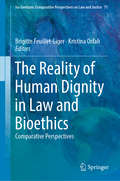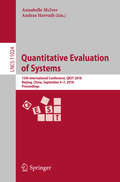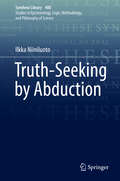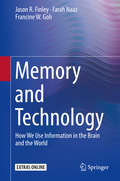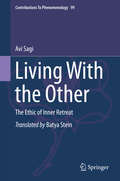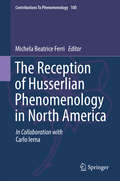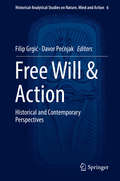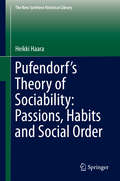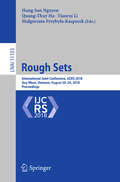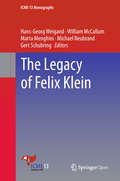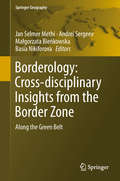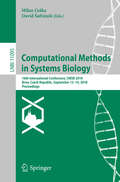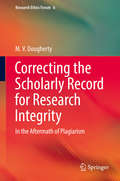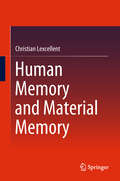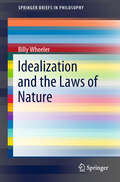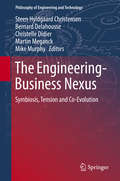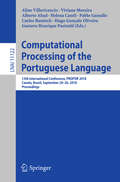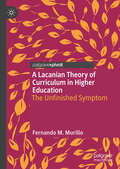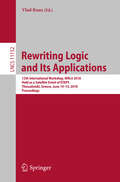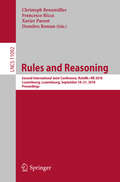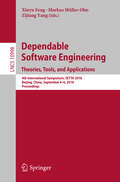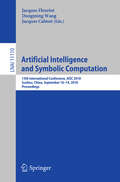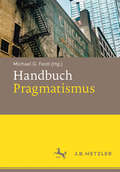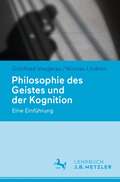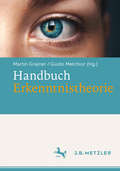- Table View
- List View
The Reality of Human Dignity in Law and Bioethics: Comparative Perspectives (Ius Gentium: Comparative Perspectives on Law and Justice #71)
by Brigitte Feuillet-Liger Kristina OrfaliAdopting an interdisciplinary perspective, this volume explores the reality of the principle of human dignity – a core value which is increasingly invoked in our societies and legal systems. This book provides a systematic overview of the legal and philosophical concept in sixteen countries representing different cultural and religious contexts and examines in particular its use in a developing case law (including of the European Court of Human Rights and of the Inter-American Court of Human Rights). Whilst omnipresent in the context of bioethics, this book reveals its wider use in healthcare more generally, treatment of prisoners, education, employment, and matters of life and death in many countries. In this unique comparative work, contributing authors share a multidisciplinary analysis of the use (and potential misuse) of the principle of dignity in Europe, Africa, South and North America and Asia. By revealing the ambivalence of human dignity in a wide range of cultures and contexts and through the evolving reality of case law, this book is a valuable resource for students, scholars and professionals working in bioethics, medicine, social sciences and law. Ultimately, it will make all those who invoke the principle of human dignity more aware of its multi-layered character and force us all to reflect on its ability to further social justice within our societies.
Quantitative Evaluation of Systems: 15th International Conference, QEST 2018, Beijing, China, September 4-7, 2018, Proceedings (Lecture Notes in Computer Science #11024)
by Annabelle McIver Andras HorvathThis book constitutes the proceedings of the 15th International Conference on Quantitative Evaluation Systems, QEST 2018, held in Beijing, China, in September 2018. The 24 full papers presented were carefully reviewed and selected from 51 submissions. The papers cover topics in the field of quantitative evaluation and verification of computer systems and networks through stochastic models and measurements emphasizing two frontier topics in research: quantitative information flow for security and industrial formal methods.
Truth-Seeking by Abduction (Synthese Library #400)
by Ilkka NiiniluotoThis book examines the philosophical conception of abductive reasoning as developed by Charles S. Peirce, the founder of American pragmatism. It explores the historical and systematic connections of Peirce's original ideas and debates about their interpretations. Abduction is understood in a broad sense which covers the discovery and pursuit of hypotheses and inference to the best explanation. The analysis presents fresh insights into this notion of reasoning, which derives from effects to causes or from surprising observations to explanatory theories.The author outlines some logical and AI approaches to abduction as well as studies various kinds of inverse problems in astronomy, physics, medicine, biology, and human sciences to provide examples of retroductions and abductions. The discussion covers also everyday examples with the implication of this notion in detective stories, one of Peirce’s own favorite themes.The author uses Bayesian probabilities to argue that explanatory abduction is a method of confirmation. He uses his own account of truth approximation to reformulate abduction as inference which leads to the truthlikeness of its conclusion. This allows a powerful abductive defense of scientific realism. This up-to-date survey and defense of the Peircean view of abduction may very well help researchers, students, and philosophers better understand the logic of truth-seeking.
Memory and Technology: How We Use Information in the Brain and the World
by Jason R. Finley Farah Naaz Francine W. GohHow is technology changing the way people remember? This book explores the interplay of memory stored in the brain (internal memory) and outside of the brain (external memory), providing a thorough interdisciplinary review of the current literature, including relevant theoretical frameworks from across a variety of disciplines in the sciences, arts, and humanities. It also presents the findings of a rich and novel empirical data set, based on a comprehensive survey on the shifting interplay of internal and external memory in the 21st century. Results reveal a growing symbiosis between the two forms of memory in our everyday lives.The book presents a new theoretical framework for understanding the interplay of internal and external memory, and their complementary strengths. It concludes with a guide to important dimensions, questions, and methods for future research.Memory and Technology will be of interest to researchers, professors, and students across the disciplines of psychology, philosophy, library and information science, human factors, media and cultural studies, anthropology and archaeology, photography, and cognitive rehabilitation, as well as anyone interested in how technology is affecting human memory._____ "This is a novel book, with interesting and valuable data on an important, meaningful topic, as well as a gathering of multidisciplinary and interdisciplinary ideas...The research is accurately represented and inclusive. As a teaching tool, I can envision graduate seminars in different disciplines drawing on the material as the basis for teaching and discussions." Dr. Linda A. Henkel, Fairfield University "This book documents the achievements of a vibrant scientific project – you feel the enthusiasm of the authors for their research. The organization of the manuscript introduces the reader into a comparatively new field the same way as pioneering authors have approached it." Prof. Dr. Wolfgang Schönpflug, Freie Universität Berlin
Living With the Other: The Ethic of Inner Retreat (Contributions To Phenomenology #99)
by Avi SagiThe book grapples with one of the most difficult questions confronting the contemporary world: the problem of the other, which includes ethical, political, and metaphysical aspects. A widespread approach in the history of the discourse on the other, systematically formulated by Emmanuel Levinas and his followers, has invested this term with an almost mythical quality—the other is everybody else but never a specific person, an abstraction of historical human existence. This book offers an alternative view, turning the other into a real being, through a carefully described process involving two dimensions referred to as the ethic of loyalty to the visible and the ethic of inner retreat. Tracing the course of this process in life and in literature, the book presents a broad and lucid picture intriguing to philosophers and also accessible to readers concerned with questions touching on the meaning of life, ethics, and politics, and particularly relevant to the burning issues surrounding attitudes to immigrants as others and to the relationship with God, the ultimate other.
The Reception of Husserlian Phenomenology in North America (Contributions To Phenomenology #100)
by Michela Beatrice Ferri Carlo IernaThis book presents a historiographical and theorical analysis of how Husserlian Phenomenology arrived and developed in North America. The chapters analyze the different phases of the reception of Edmund Husserl’s thought in the USA and Canada. The volume discusses the authors and universities that played a fundamental role in promoting Husserlian Phenomenology and clarifies their connection with American Philosophy, Pragmatism, and with Analytic Philosophy. Starting from the analysis of how the first American Scholars of Edmund Husserl's thought opened the door to the reception of his texts, the book explores the first encounters between Pragmatism and Husserlian Phenomenology in American Universities. The study focuses, then, on those Scholars who fled from Europe to America, from 1933 onwards, to escape Nazism - Felix Kaufmann, Alfred Schutz, Aron Gurwitsch, Herbert Spiegelberg, Fritz Kaufmann, among the most notable - and illustrates how their teaching provided the very basis for the spreading of Husserlian Phenomenology in North America. The volume examines, then, the action of the 20th Century North-American Husserl Scholars, together with those places, societies, centers, and journals, specifically created to represent the development of the studies devoted to Husserlian Phenomenology in the U.S., with a focus of the Regional Phenomenological Schools.
Free Will & Action: Historical and Contemporary Perspectives (Historical-Analytical Studies on Nature, Mind and Action #6)
by Filip Grgić Davor PećnjakThis book consists of eleven new essays that provide new insights into classical and contemporary issues surrounding free will and human agency. They investigate topics such as the nature of practical knowledge and its role in intentional action; mental content and explanations of action; recent arguments for libertarianism; the situationist challenge to free will; freedom and a theory of narrative configuration; the moral responsibility of the psychopath; and free will and the indeterminism of quantum mechanics. Also tackling some historical precursors of contemporary debates, taken together these essays demonstrate the need for an approach that recognizes the multifaceted nature of free will. This book provides essential reading for anyone interested in the current scholarship on free will.
Pufendorf’s Theory of Sociability: Passions, Habits and Social Order (The New Synthese Historical Library #77)
by Heikki HaaraThis book centres on Samuel Pufendorf’s (1632–1694) moral and political philosophy, a subject of recently renewed interest among intellectual historians, philosophers and legal scholars in the English-speaking world. Pufendorf’s significance in conceptualizing sociability in a way that ties moral philosophy, the theory of the state, political economy, and moral psychology together has already been acknowledged, but this book is the first systematic investigation of the moral psychological underpinnings of Pufendorf’s theory of sociability in their own right. Readers will discover how Pufendorf’s psychological and social explanation of sociability plays a crucial role in his natural law theory. By drawing attention to Pufendorf’s scattered remarks and observations on human psychology, a new interpretation of the importance of moral psychology is presented. The author maintains that Pufendorf’s reflection on the psychological and physical capacities of human nature also matters for his description of how people adopt sociability as their moral standard in practice. We see how, since Pufendorf’s interest in human nature is mainly political, moral psychological formulations are important for Pufendorf’s theorizing of social and political order. This work is particularly useful for scholars investigating the multifaceted role of passions and emotions in the history of moral and political philosophy. It also affords a better understanding of what later philosophers, such as Smith, Hume or Rousseau, might have find appealing in Pufendorf’s writings. As such, this book will also interest researchers of the Enlightenment, natural law and early modern philosophy.
Rough Sets: International Joint Conference, IJCRS 2018, Quy Nhon, Vietnam, August 20-24, 2018, Proceedings (Lecture Notes in Computer Science #11103)
by Tianrui Li Hung Son Nguyen Quang-Thuy Ha Małgorzata Przybyła-KasperekThis LNAI 1103 constitutes the proceedings of the International Joint Conference on Rough Sets, IJCRS 2018, held in Quy Nhon, Vietnam, in August 2018.The 40 full papers presented together with 5 short papers were carefully reviewed and selected from 61 submissions. The IJCRS conferences aim at bringing together experts from universities and research centers as well as the industry representing fields of research in which theoretical and applicational aspects of rough set theory already find or may potentially find usage.
The Legacy of Felix Klein (ICME-13 Monographs)
by Michael Neubrand Hans-Georg Weigand Gert Schubring William McCallum Marta MenghiniThis open access book provides an overview of Felix Klein’s ideas, highlighting developments in university teaching and school mathematics related to Klein’s thoughts, stemming from the last century. It discusses the meaning, importance and the legacy of Klein’s ideas today and in the future, within an international, global context. Presenting extended versions of the talks at the Thematic Afternoon at ICME-13, the book shows that many of Klein’s ideas can be reinterpreted in the context of the current situation, and offers tips and advice for dealing with current problems in teacher education and teaching mathematics in secondary schools. It proves that old ideas are timeless, but that it takes competent, committed and assertive individuals to bring these ideas to life. Throughout his professional life, Felix Klein emphasised the importance of reflecting upon mathematics teaching and learning from both a mathematical and a psychological or educational point of view. He also strongly promoted the modernisation of mathematics in the classroom, and developed ideas on university lectures for student teachers, which he later consolidated at the beginning of the last century in the three books on elementary mathematics from a higher standpoint.
Borderology: Along the Green Belt (Springer Geography)
by Jan Selmer Methi Andrei Sergeev Małgorzata Bieńkowska Basia NikiforovaThis book provides a unique and multifaceted view on and understanding of borders and their manifestations: physical and mental, cultural and geographical, and as a question of life and death. It highlights the Green Belt along the Iron Curtain, which offered a haven for rare species for many decades and, after the Cold War, became a veritable treasure trove for a European network of researchers. A geographical border is something that can be seen, but other borders sometimes have to be crossed to be discovered. The border zone is an arena for development that is not found in any other places. This book focuses on borderology, which became the name of a cross-border study and research program that explores the border zone from multiple perspectives. This cross-disciplinary book will appeal to interested researchers and students from many fields, from philosophy and diplomacy to ecology and geography.
Computational Methods in Systems Biology: 16th International Conference, CMSB 2018, Brno, Czech Republic, September 12-14, 2018, Proceedings (Lecture Notes in Computer Science #11095)
by David Šafránek Milan ČeškaThis book constitutes the refereed proceedings of the 16th International Conference on Computational Methods in Systems Biology, CMSB 2018, held in BRNO, Czech Republic, in September 2018. The 15 full and 7 short papers presented together with 5 invited talks were carefully reviewed and selected from 46 submissions. Topics of interest include formalisms for modeling biological processes; models and their biological applications; frameworks for model verification, validation, analysis, and simulation of biological systems; high-performance computational systems biology; parameter and model inference from experimental data; automated parameter and model synthesis; model integration and biological databases; multi-scale modeling and analysis methods; design, analysis, and verification methods for synthetic biology; methods for biomolecular computing and engineered molecular devices.Chapters 3, 9 and 10 are available open access under a Creative Commons Attribution 4.0 International License via link.springer.com.
Correcting the Scholarly Record for Research Integrity: In the Aftermath of Plagiarism (Research Ethics Forum #6)
by M. V. DoughertyThis volume is the first book-length study on post-publication responses to academic plagiarism in humanities disciplines. It demonstrates that the correction of the scholarly literature for plagiarism is not a task for editors and publishers alone; each member of the research community has an indispensable role in maintaining the integrity of the published literature in the aftermath of plagiarism. If untreated, academic plagiarism damages the integrity of the scholarly record, corrupts the surrounding academic enterprise, and creates inefficiencies across all levels of knowledge production. By providing case studies from the field of philosophy and related disciplines, the volume exhibits that current post-publication responses to academic plagiarism are insufficient. It catalogues how humanities disciplines fall short in comparison with the natural and biomedical sciences for ensuring the integrity of the body of published research. This volume provides clarity about how to conceptualize the scholarly record, surveys the traditional methods for correcting it, and argues for new interventions to improve the reliability of the body of published research. The book is valuable not only to those in the field of philosophy and other humanities disciplines, but also to those interested in research ethics, meta-science, and the sociology of research.
Human Memory and Material Memory
by Christian LexcellentThis book investigates the fascinating concept of a continuum between human memory and memory of materials. The first part provides state-of-the-art information on shape memory alloys and outlines a brief history of memory from the ancient Greeks to the present day, describing phenomenological, philosophical, and technical approaches such as neuroscience. Then, using a wealth of anecdotes, data from academic literature, and original research, this short book discusses the concepts of post-memory, memristors and forgiveness, highlights the analogies between materials defects and memory traces in the human brain. Lastly, it tackles questions of how human memory and memory of materials work together and interact. With insights from materials mechanics, neuroscience and philosophy, it enables readers to understand and continue this open debate on human memory.
Idealization and the Laws of Nature (SpringerBriefs in Philosophy)
by Billy WheelerThis new study provides a refreshing look at the issue of exceptions and shows that much of the problem stems from a failure to recognize at least two kinds of exception-ridden law: ceteris paribus laws and ideal laws. Billy Wheeler offers the first book-length discussion of ideal laws. The key difference between these two kinds of laws concerns the nature of the conditions that need to be satisfied and their epistemological role in the law’s formulation and discovery. He presents a Humean-inspired approach that draws heavily on concepts from the information and computing sciences. Specifically, Wheeler argues that laws are best seen as algorithms for compressing empirical data and that ideal laws are needed as 'lossy compressors' for complex data.Major figures in the metaphysics of science receive special attention such as Ronald Giere, Bas van Fraassen, Nancy Cartwright, David Lewis and Marc Lange. This book is essential reading for philosophers of science and will interest metaphysicians, epistemologists and others interested in applying concepts from computing to traditional philosophical problems.
The Engineering-Business Nexus: Symbiosis, Tension and Co-Evolution (Philosophy of Engineering and Technology #32)
by Steen Hyldgaard Christensen Christelle Didier Martin Meganck Mike Murphy Bernard DelahousseFascinating and compelling in equal measure this volume presents a critical examination of the multilayered relationships between engineering and business. In so doing the study also stimulates ethical reflection on how these relationships either enhance or inhibit strategies to address vital issues of our time. In the context of geopolitical, economic, and environmental tendencies the authors explore the world that we should want to create and the role of the engineer and the business manager in this endeavor. Throughout this volume the authors identify periods of alignment and periods of tension between engineering and business. They look at focal points of the engineering-business nexus related to the development of capitalism. The book explores past and present movements to reshape, reform, or reject this nexus.The volume is informed by questions of importance for industry as well as for higher education. These are: What kinds of conflict arise for engineers in their attempts to straddle both professional and organizational commitments? How should professionals be managed to avoid a clash of managerial and professional cultures? How do engineers create value in firms and corporations? What kinds of tension exist between higher education and industry? What challenges does the neoliberal entrepreneurial university pose for management, faculty, students, society, and industry? Should engineering graduates be ready for work, and can they possibly be? What kinds of business issues are reflected in engineering education curricula, and for what purpose? Is there a limit to the degree of business hybridization in engineering degree programs, and if so, what would be the criterion for its definition? Is there a place in engineering education curricula for reflective critique of assumptions related to business and economic thinking? One ideal of management and control comes to the fore as the Anthropocene - the world transformed into an engineered artefact which includes human existence. The volume raises the question as to how engineering and business together should be considered, given the fact that the current engineering-business nexus remains embedded within an economic model of continual growth. By addressing macro-level issues such as energy policy, sustainable development, globalization, and social justice this study will both help create awareness and stimulate development of self-knowledge among practitioners, educators, and students thereby ultimately addressing the need for better informed citizens to safeguard planet Earth as a human life supporting system.
Computational Processing of the Portuguese Language: 13th International Conference, PROPOR 2018, Canela, Brazil, September 24–26, 2018, Proceedings (Lecture Notes in Computer Science #11122)
by Carlos Ramisch Aline Villavicencio Alberto Abad Viviane Moreira Helena Caseli Pablo Gamallo Hugo Gonçalo Oliveira Gustavo Henrique PaetzoldThis book constitutes the refereed proceedings of the 13th International Conference on Computational Processing of the Portuguese Language, PROPOR 2018, held in Canela, RS, Brazil, in September 2018.The 42 full papers, 3 short papers and 4 other papers presented in this volume were carefully reviewed and selected from 92 submissions. The papers are organized in topical sections named: Corpus Linguistics, Information Extraction, LanguageApplications, Language Resources, Sentiment Analysis and Opinion Mining, Speech Processing, and Syntax and Parsing.
A Lacanian Theory of Curriculum in Higher Education: The Unfinished Symptom
by Fernando M. MurilloThis volume presents a distinctively Lacanian psychoanalytic approach to the theorizing, understanding, and critique of curriculum in higher education. In this work, the author presents the main theories of curriculum in the current discourse, develops a notion of critique, and applies it to existing global guidelines for curriculum reform. Relying on the architectonic of the subject as developed across the work of Jacques Lacan—expressed in the registers of the Symbolic, the Imaginary, and the Real—the author provides a new approach to understanding curriculum in terms of the psychic dynamics that explain its workings.
Rewriting Logic and Its Applications: 12th International Workshop, Wrla 2018, Held As A Satellite Event Of Etaps, Thessaloniki, Greece, June 14-15, 2018, Proceedings (Lecture Notes in Computer Science #11152)
by Vlad RusuThis book constitutes revised selected papers from the 12th International Workshop on Rewriting Logic and Its Applications, WRLA 2018, held in Thessaloniki, Greece, in June 2018. The 12 full papers presented in this volume were carefully reviewed and selected from 21 submissions. They deal with rewriting, a natural model of computation and an expressive semantic framework for concurrency, parallelism, communication, and interaction, and its applications.
Rules and Reasoning: Second International Joint Conference, RuleML+RR 2018, Luxembourg, Luxembourg, September 18–21, 2018, Proceedings (Lecture Notes in Computer Science #11092)
by Dumitru Roman Christoph Benzmüller Francesco Ricca Xavier ParentThis book constitutes the proceedings of the International Joint Conference on Rules and Reasoning, RuleML+RR 2018, held in Luxembourg during September 2018. This is the second conference of a new series, joining the efforts of two existing conference series, namely “RuleML” (International Web Rule Symposium) and “RR” (Web Reasoning and Rule Systems).The 10 full research papers presented together with 5 long technical communications and 7 short papers were carefully reviewed and selected from 33 submissions.
Dependable Software Engineering. Theories, Tools, and Applications: 4th International Symposium, Setta 2018, Beijing, China, September 4-6, 2018, Proceedings (Lecture Notes in Computer Science #10998)
by Xinyu Feng Markus Müller-Olm Zijiang YangThis book constitutes the proceedings of the Third International Symposium on Dependable Software Engineering: Theories, Tools, and Applications, SETTA 2018, held in Beijing, China, in September 2018. The 9 full papers presented together with 3 short papers were carefully reviewed and selected from 22 submissions. The purpose of SETTA is to provide an international forum for researchers and practitioners to share cutting-edge advancements and strengthen collaborations in the field of formal methods and its interoperability with software engineering for building reliable, safe, secure, and smart systems.
Artificial Intelligence and Symbolic Computation: 13th International Conference, AISC 2018, Suzhou, China, September 16–19, 2018, Proceedings (Lecture Notes in Computer Science #11110)
by Jacques Fleuriot Dongming Wang Jacques CalmetThis book constitutes the refereed proceedings of the 13th International Conference on Artificial Intelligence and Symbolic Computation, AISC 2018, held in Suzhou, China, in September 2018. The 13 full papers presented together with 5 short and 2 invited papers were carefully reviewed and selected from 31 submissions. The AISC conference is an important forum when it comes to ensuring that ideas, theoretical insights, methods and results from traditional AI can be discussed and showcased, while fostering new links with other areas of AI such as probabilistic reasoning and deep learning.
Handbuch Pragmatismus
by Michael G. FestlDas Handbuch bietet einen umfassenden und verlässlichen Überblick über die Philosophie des Pragmatismus. Als eine jeglichem Dogmatismus feindlich gegenüberstehende Denkhaltung kann man den Pragmatismus als besonders geeignet ansehen, einen philosophischen Beitrag zur Lösung vielschichtiger Probleme der globalisierten Welt zu leisten.Das Handbuch ist in sechs inhaltliche Teile gegliedert. Ausgehend von den klassischen Denkern und damit den philosophischen Grundlagen des Pragmatismus, stehen inhaltlich-thematische Fragestellungen im Fokus sowie Positionen vor allem gegenwärtiger pragmatistischer Denkerinnen und Denker. Das Handbuch wird durch ein Kapitel beschlossen, das sich mit ausgewählten aktuellen philosophischen und gesellschaftlichen Themen und Herausforderungen beschäftigt und das die theoretischen Beiträge skizziert, die auf Basis des Pragmatismus hierzu gerade entwickelt werden.
Philosophie des Geistes und der Kognition: Eine Einführung
by Gottfried Vosgerau Nicolas LindnerWas ist der Geist und wie funktioniert er? Die Philosophie des Geistes hat sich im Laufe der zweiten Hälfte des 20. Jahrhunderts – neben der Erkenntnistheorie und der Metaphysik – zu einer der zentralen Subdisziplinen der Theoretischen Philosophie herausgebildet. Das Lehrbuch behandelt nicht nur die klassischen Themen der Philosophie des Geistes, sondern stellt auch die neuesten Entwicklungen in Grundzügen vor. Dazu gehören Diskussionen zum Verhältnis des Geistes zum Körper und zur Umwelt, das Verständnis Anderer, Emotionen sowie das Verhältnis von Denken und Sprache. In erster Linie richtet sich das Lehrbuch an Personen, die mit dem Philosophiestudium angefangen haben oder sich einfach einen Überblick über philosophische Fragen und Diskussionen rund um den Geist und unsere geistigen Fähigkeiten verschaffen wollen. – Mit Definitionen, Beispielen und Literaturhinweisen sowie übersichtlichen Zusammenfassungen zur Selbst-Überprüfung.
Handbuch Erkenntnistheorie
by Martin Grajner Guido MelchiorDie Erkenntnistheorie zählt zu den wichtigsten Teildisziplinen der theoretischen Philosophie. Seit 2000 hat sich die Disziplin sehr stark entwickelt. In diesem Zeitraum wurden in der Forschungsliteratur viele neue Antworten auf klassische erkenntnistheoretischen Fragen hervorgebracht und auch gänzlich neue Fragen und Probleme behandelt. Das Handbuch liefert einen Überblick über die aktuelle Entwicklung der Disziplin.
